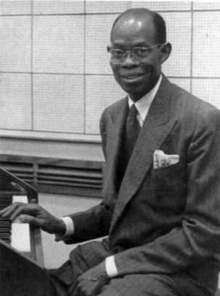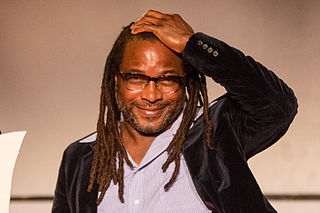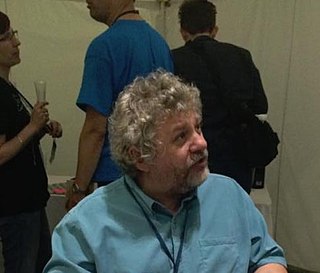
Radio drama is a dramatized, purely acoustic performance. With no visual component, radio drama depends on dialogue, music and sound effects to help the listener imagine the characters and story: "It is auditory in the physical dimension but equally powerful as a visual force in the psychological dimension." Radio drama includes plays specifically written for radio, docudrama, dramatized works of fiction, as well as plays originally written for the theatre, including musical theatre, and opera.

The music of Nigeria includes many kinds of folk and popular music, styles of folk music are related to the multitudes of ethnic groups in the country, each with their own techniques, instruments, and songs. Little is known about the country's music history prior to European contact, although bronze carvings dating back to the 16th and 17th centuries have been found depicting musicians and their instruments. The country's most internationally renowned genres are Indigenous, Apala, Ogene, Fuji, Jùjú, Afrobeat, Afrobeats, Igbo Highlife, Afro-juju, Waka, Igbo rap, Yo-pop, Gospel. The largest ethnic groups are the Igbo, Hausa and Yoruba. Traditional music from Nigeria and throughout Africa is almost always functional; in other words, it is performed to mark a ritual such as the wedding or funeral and not to achieve artistic goals. Although some Nigerians, especially children and the elderly, play instruments for their own amusement, solo performance is otherwise rare. Music is closely linked to agriculture, and there are restrictions on, for example, which instruments can be played during different parts of the planting season.
A miniseries or mini-series is a television series that tells a story in a predetermined, limited number of episodes. A miniseries can also be referred to and can also be shown as a television film in a limited number of episodes too. "Limited series" is another more recent U.S. term which is sometimes used interchangeably. As of 2021, the popularity of miniseries format has increased in both streaming services and broadcast television.

Nigerian literature may be roughly defined as the literary writing by citizens of the nation of Nigeria for Nigerian readers, addressing Nigerian issues. This encompasses writers in a number of languages, including not only English but Igbo, Urhobo, Yoruba, and in the northern part of the county Hausa and Nupe. More broadly, it includes British Nigerians, Nigerian Americans and other members of the African diaspora.

Chief Olufela Obafunmilayo "Fela" Sowande MBE was a Nigerian musician and composer. Considered the father of modern Nigerian art music, Sowande is perhaps the most internationally known African composer of works in the European "classical" idiom.

Oyo State is an inland state in southwestern Nigeria. Its capital is Ibadan, the third most populous city in the country and formerly the second most populous city in Africa. Oyo State is bordered to the north by Kwara State, to the east by Osun State, and to the southwest by Ogun State and the Republic of Benin. With a projected population of 7,840,864 in 2016, Oyo State is the fifth most populous in the Nigeria.

The Nigerian Television Authority or NTA is a Nigerian government-owned and partly commercial broadcast station. Originally known as Nigerian Television (NTV), it was inaugurated in 1977 with a monopoly on national television broadcasting, after a takeover of regional television stations by military governmental authorities in 1976. After declining interest from the public in government-influenced programming, it lost its monopoly over television broadcasting in Nigeria in the 1990s.
Akinwunmi Isola was a Nigerian playwright, novelist, actor, dramatist, culture activist and scholar. He was known for his writing in, and his work in promoting, the Yoruba language. As an actor, he was known for Agogo Eèwò (2002), Efunsetan Aniwura (1981) and Efunsetan Aniwura (2005).
Osonye Tess Onwueme, also known as T. Akaeke Onwueme is a Nigerian playwright, scholar and poet, who rose to prominence writing plays with themes of social justice, culture, and the environment. In 2010, she became the university Professor of Global Letters, following her exceptional service as Distinguished Professor of Cultural Diversity and English at the University of Wisconsin–Eau Claire. Through her plays, she is able to use the theatre as a medium to showcase historically silenced views such as African women, and shedding more light on African life. She sustains her advocacy for the global poor and youth, along with the experiences and concerns of the African Diaspora in her creative work. In 2007, the U.S. State Department appointed her to the Public Diplomacy Speaker Program for North, East, and West India. The 2009 Tess International Conference: Staging Women, Youth, Globalization, and Eco-Literature, which was exclusively devoted to the author's work, was successfully held by international scholars in the Nigerian capital, Abuja, following the Fonlon-Nichols award to the dramatist. She is regarded as one of the band of more important African authors. She also is an active speaker regarding domestic violence.

Biyi Bandele was a Nigerian novelist, playwright and filmmaker. He was the author of several novels, beginning with The Man Who Came in From the Back of Beyond (1991), as well as writing stage plays, before turning his focus to filmmaking. His directorial debut was in 2013 with Half of a Yellow Sun, based on the 2006 novel of the same name by Chimamanda Ngozi Adichie.
Adebayo Mosobalaje Faleti was Africa's first newscaster, Africa's first stage play director, Nigeria's first film editor and librarian with the first television station in Africa - Western Nigeria Television (WNTV), Nigeria's first Yoruba presenter on television and radio alike, a Nigerian poet, journalist, writer, Nollywood film director and actor. He was also known as a Yoruba translator, a broadcaster, TV exponent and pioneer of the first television station in Africa, Western Nigeria Television (WNTV), now known as the Nigerian Television Authority (NTA).

Robert Charles Shearman, sometimes credited as Rob Shearman, is an English television, radio, stage play and short story writer. He is known for his World Fantasy Award-winning short stories, as well as his work for Doctor Who, and his association with Jarvis & Ayres Productions which has resulted in six plays for BBC Radio 4, broadcast in the station's regular weekday Afternoon Play slot, and one classic serial.
Philip Begho is a Nigerian writer, the author of more than forty books. Born in Warri, Delta State, of an Itsekiri father and a mother of mixed race, he received his secondary school education at King's College, Lagos, and obtained an LLB. from the University of Lagos and an LL.M. from the University of London. Though he currently works as a full-time writer, he has worked as a journalist, a banker, a businessman, a legal practitioner and a university lecturer. He has also engaged in film and theatrical production. His dramatic writing cuts across film, television, radio and the stage, and several of his stage plays have won awards. He also writes songs and non-fiction works, and his law book Company Formation: Precedents on Objects of Incorporation has gone into several editions.

Taiwo Odubiyi is a Nigerian author, international speaker, a marriage and relationship counsellor. She is the senior associate pastor, alongside her husband, Reverend Sola Odubiyi, of The Still Waters Church International with headquarters in Ikorodu, Lagos, Nigeria. Taiwo has written over 20 award-winning inspirational romance novels; children's books; and self-help books on rape and relationships, with new novels/books being published every year. She is the president of TenderHearts Family Support Initiative and the founder of the Pastor Taiwo Odubiyi Ministries. She is also a televangelist; a columnist in The Nigerian Canadian News, The National Mirror, and The US immigration Newspaper; and the host of the Nigerian radio and television programme It's All About You.

Lekan Balogun is a Nigerian dramatist and theatre director. His plays include Moremi Ajaasoro, performed as the Western zone's entry for the Festival of Nigerian Plays ; Olofin Ajaye and The Mote in the Eye, NANTAP International Theatre Day, 2008 and 2009/20th Anniversary Play projects; The Rejected Stone, an African retelling of the popular fable Cinderella, Alaafin Kanran, Farewell and Dirty Circle for Royal Court Theatre, London, excerpt performed at the Sloane Square, Jerwood Theatre, London, in 2009 with sponsorship from the British Council, Nigeria & GENESIS Foundation, UK; The Ghost Catcher; Goodbye Yesterday; Our Tomorrow Today; Ijebu 1832; For Heroes and Scoundrels, among others. He wrote and directed a play about Zulu folklore (Izibongo) and history in 2008 with the title Shaka, the Zulu legend.

Navnindra Behl is an Indian theatre and television director, writer and actor.

Dul Johnson is a Nigerian filmmaker and author. He began his career as a drama director with the Nigerian Television Authority, Jos, and worked for many years before retiring into independent filmmaking and teaching. His best-known films include There is Nothing Wrong with my Uncle, The Widow’s Might, Against the Grain, Wasting for the West, and Basket of Water.

Akin Lewis is a Nigerian film actor, director, and producer.
This article is focused on English-language literature rather than the literature of England, so that it includes writers from Scotland, Wales, and the whole of Ireland, as well as literature in English from former British colonies. It also includes, to some extent, the United States, though the main article for that is American literature.











